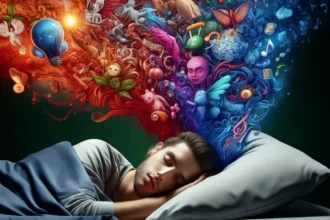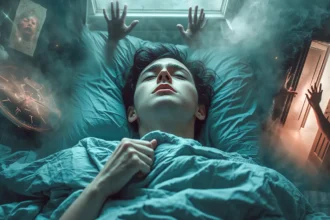You wake up breathless, still caught in a dream. Images flicker. A voice. A feeling. You try to hold it, but dream recall slips away before you even reach the pen.
- What Memory Does When You Sleep
- Why Dream Memories Vanish
- Experimental Studies & Findings
- Individual Differences in Dream Recall
- Why It Matters: Emotional and Memory Processing
- Experimental Studies & Findings
- Practical Tips to Boost Dream Recall
- Caveats and What We Still Don’t Know
- Conclusion and Key Takeaways
- Further Reading
- FAQ
Even powerful dreams often disappear within minutes. You might remember fragments, but lack the full narrative. That lost potential is the core of many people’s frustration.
This guide explains the science behind forgetting, how your brain works in sleep, and concrete steps that strengthen remembering dreams.
What Memory Does When You Sleep
Sleep moves through cycles. REM sleep is where dreams are strongest and where dream recall has its best chance. In REM, brain activity nearly mirrors waking states, but memory systems are drowsy.
Emotional centers like the amygdala are highly active during REM. However, the hippocampus, which helps store memories, shows reduced or altered engagement. This creates vivid experiences that aren’t stored properly, limiting recall after waking.
Because there is no sensory reinforcement or repetition, your brain doesn’t anchor dream content like it anchors waking events. This absence weakens memory for dreams over time.
In short, the brain is generating emotion and imagery, not encoding clear memory. That explains why even unforgettable dreams rarely survive the immediate shift into wakefulness and why remembering them is elusive.
Why Dream Memories Vanish
Dreams often lack structure. Without clear beginning, place, or sequence, the brain does not treat them as cohesive events. That missing narrative scaffold undermines dream recall.
Neurochemical shifts in REM matter. Norepinephrine is near zero. The hippocampus shows reduced or altered engagement, and the prefrontal cortex is relatively quiet.
Without those supports, organization and tagging fail, so retrieval rarely persists.
Because the prefrontal cortex, responsible for logic, context, and narration, is quiet, the dreaming mind lacks an internal editor. Scenes remain fragmented and difficult to reconstruct, reducing the odds of later recall.
Sudden awakenings interfere too. A sharp alarm or external noise can yank you from sleep before any consolidation can occur. That break aborts potential remembering before it begins.
Even when dreams feel intense or vivid, much of that emotional surge doesn’t translate to memory stores. Those parts stay in transient circuits, not long-term ones tied to recall.
Thus, forgetting dreams is not your fault. Your brain simply deprioritizes them for storage. Unless you intervene immediately, dream recall fades in the dawn light.
Experimental Studies & Findings
Researchers have designed experiments where sleepers are awakened during REM. Upon waking, participants report dreams or nothing. Their brain activity before awakening often predicts whether content will be recalled.
Some studies train participants over weeks to report dreams. These dream diary interventions show that deliberate practice boosts remembering over time. The brain becomes more attuned to capturing nocturnal content.
Imaging studies reveal distinct patterns. When a dream is later reported, certain cortical areas show elevated activity just before waking. That differs from non-recalled dreams, which show weaker signaling in memory circuits.
Other experiments examine sleep deprivation or pharmacological modulation. They test whether altering neurotransmitter levels affects recall probability. Results suggest chemical balance in sleep state matters greatly.
Cross-cultural and longitudinal studies contribute too. They track how recall changes with age, stress, or life transitions. Some people lose memory for dreams in high stress periods.
Others regain it later.
These collective findings illustrate that remembering dreams is not random. It reflects brain state, training, and timing. The research guides us in crafting habits that favor reliable recall.
Individual Differences in Dream Recall
People differ in dream recall. Openness, curiosity, and reflective habits correlate with remembering. These traits keep attention primed.
When waking arrives, readiness helps convert impressions into retrievable memories before they dissolve.
Brain connectivity matters. Stronger communication between frontal and temporal regions supports monitoring when sleep lightens. That network assists recall by preparing narrative scaffolding and context the brain can grasp upon waking.
Sleep architecture shapes opportunity. Some people experience micro awakenings that open windows for encoding. Others remain in long REM runs with fewer interruptions, which reduces chances to remember unless a wake transition occurs.
Emotion influences remembering. Strong affect creates arousal that can mark experiences for later access. When arousal aligns with awakening, recall improves because the body signals importance while the mind crosses into awareness.
Habits matter. Setting intention, keeping a bedside journal, and recording train attention. Over weeks these routines raise dream recall frequency by teaching your brain that nocturnal content is valuable and should be captured quickly.
Biology sets limits. Genetics, medication, and neurological differences create ceilings for improvement. You can enhance remembering dreams meaningfully, yet respecting your baseline helps you measure progress realistically and avoid discouragement during quieter periods.
Note: NREM awakenings can also produce dream recall when cortical activation is higher, which supports the activation hypothesis beyond REM.
Why It Matters: Emotional and Memory Processing
Dreams may support emotional regulation. By replaying charged material in safer conditions, the brain reduces sting and promotes resilience. Even without dream recall, that processing can lighten daytime reactivity and improve coping capacity.
Memory integration is another candidate function. Dreaming may weave new information into existing networks. Forgotten content can still influence learning.
Gains appear as insight, smoother performance, or intuitive leaps rather than dream recall.
Threat simulation theories propose rehearsals. The brain runs scenarios, tests responses, and stores general rules. Even absent dream recall, the extracted patterns may guide behavior, helping you adapt when challenges appear in waking life.
Creativity benefits as well. Fragments surface as metaphors, melodies, or solutions. By improving dream recall, you capture more raw material.
Those elements can seed projects, accelerate problem solving, and expand creative possibilities significantly.
In therapy, dreams can highlight themes. With better dream recall, clients and clinicians track patterns across weeks, linking emotions, triggers, and progress. Even images become useful prompts for dialogue, exposure planning, and meaning making.
Ultimately, forgetting serves balance. Dream recall is helpful, not mandatory. The brain filters noise to protect clarity.
Strengthen recall when it benefits growth, and allow forgetting when rest and reset feel more restorative.
Experimental Studies & Findings
Researchers have designed experiments where sleepers are awakened during REM. Upon waking, participants report dreams or nothing. Their brain activity before awakening often predicts if they’ll recall content.
Some studies train participants over weeks to report dreams. These “dream diary” interventions show that deliberate practice boosts dream recall over time. The brain becomes more attuned to capturing nocturnal content.
Imaging studies reveal distinct patterns. When a dream is recalled, certain cortical areas show elevated activity just before waking. That differs from non recalled dreams, which show weaker signaling in memory circuits.
Other experiments examine sleep deprivation or pharmacological modulation. They test whether altering neurotransmitter levels affects recall probability. Results suggest chemical balance in sleep state matters greatly.
Cross cultural and longitudinal studies contribute too. They track how recall changes with age, stress, or life transitions. Some people lose dream memory in high stress periods; others regain it later.
These collective findings illustrate that remembering dreams is not random. It reflects brain state, training, and biology. The research guides us in crafting habits that favor recall.
Practical Tips to Boost Dream Recall
Set intention nightly. Before sleep, tell yourself clearly that you will remember dreams. This primes attention, increases metacognitive awareness during REM, and prepares your brain to capture dream recall at the fragile wake boundary.
Keep a bedside notebook or voice recorder ready. When you wake, stay still, eyes closed, and replay images.
Write keywords first, then details. Recording immediately strengthens pathways supporting dream recall during early waking.
Wake gently whenever possible. Use gradual alarms or light based cues instead of abrupt sounds. A softer transition preserves imagery and improves dream recall by giving memory systems seconds to stabilize before interference.
During the day, practice micro recall. Pause, close your eyes, and reconstruct recent moments. This strengthens retrieval cues and makes dream recall easier because your brain learns to rebuild scenes from sparse traces.
Review notes daily. Highlight recurring themes, characters, places, and emotions. Pattern recognition primes attention for future nights, nudging dream recall higher.
Over weeks, your recall window expands as familiarity speeds reconstruction during waking transitions.
Be patient and consistent. Biological ceilings exist, yet practice improves dream recall. Track frequency, duration, and detail quality rather than perfection.
Celebrate wins, then keep going. Habits compound, and your capture rate climbs.
Caveats and What We Still Don’t Know
Dream research has limits. Many findings rely on self reports, small samples, and lab awakenings. These methods alter sleep, shape expectations, and can inflate dream recall compared with nights at home under natural conditions.
Language introduces bias. People label similar experiences differently. One says dream, another says thought.
Those distinctions change counts, detail ratings, and confidence, complicating comparisons and any conclusions about real capacity to remember dreams consistently.
Laboratory settings are artificial. Electrodes, cameras, and scheduled awakenings fragment sleep and increase vigilance. Participants anticipate disruption, sleep lighter, and report differently.
Results often overestimate remembering compared with quieter nights in familiar bedrooms and routines.
Emotion complicates measurement. Arousal may tag memories, yet it can also distort content. People remember the feeling more than the storyline.
Studies disagree on mechanisms, leaving uncertainty about how emotion truly interacts with recall.
Lifestyle factors add noise. Caffeine, alcohol, stress, medications, and irregular schedules reshape sleep architecture. These variables can mask genuine differences in remembering dreams or create temporary spikes that fade when routines stabilize again later.
Treat conclusions as provisional. Evidence grows, yet gaps remain. Use consistent personal methods, document conditions, and compare yourself to yourself.
That approach yields clearer insight into your evolving dream recall profile across weeks and months.
Conclusion and Key Takeaways
Dreams fade quickly because sleeping brains favor emotion over storage. Memory systems idle, narration quiets, and structure dissolves. You wake holding impressions, not records, which explains persistent gaps and frustrations around dependable dream recall.
REM chemistry reduces norepinephrine, undermining encoding. The hippocampus contributes less, while prefrontal cortex stays quiet. That combination produces vivid scenes that rarely become stable memories, leaving dream recall dependent on timing and awakenings.
Forgetting serves a function. Filtering prevents overload, allowing clarity during waking life. Not every episode deserves storage.
Selectivity protects balance and ensures energy goes toward learning that matters more than perfect dream recall.
You can improve outcomes with habits. Set intention nightly, wake gradually, remain still, and record immediately. Over weeks, those behaviors strengthen access at the wake boundary and increase dream recall consistency and detail.
Use metrics that motivate. Track frequency, clarity, and time to recording. Trends matter more than single nights.
Celebrate gains and update routines. Sustainable progress builds confidence and reinforces attention that supports reliable dream recall.
Bottom line, dream recall is trainable within limits. Respect biology, reduce interference, and practice deliberately. When preparation meets timing, remembering rises.
Keep tools nearby, review regularly, and turn fleeting experiences into usable insight.
Further Reading
- The individual determinants of morning dream recall, V. Elce et al., Nature (2025)
This study links mind wandering, sleep pattern, and dream attitude to recall probability.
https://www.nature.com/articles/s44271-025-00191-z (Nature) - Dream recall frequency and psychosomatics, D. Dal Sacco et al., PMC / NCBI (2022)
Explores how personality, cognition, mental state, and somatic factors influence recall.
https://www.ncbi.nlm.nih.gov/pmc/articles/PMC9171870/ (PMC) - Dreaming and the brain: from phenomenology to neurophysiology, Y. Nir & others, PMC / NCBI (2010)
Classic review linking brain structure, lesions, and dreaming mechanisms.
https://www.ncbi.nlm.nih.gov/pmc/articles/PMC2814941/ (PMC) - Sleep, dreams, and memory consolidation: The role of hippocampus and emotional processing, J. D. Payne et al., PMC / NCBI (2004)
Links dream content to memory consolidation and emotional integration during sleep.
https://www.ncbi.nlm.nih.gov/pmc/articles/PMC534695/ (PMC) - High dream recall frequency is associated with increased creativity, R. Vallat et al., Neuroscience & Social Science / DovePress (2022)
Shows correlation of dream recall frequency with creativity and default mode network.
https://www.dovepress.com/high-dream-recall-frequency-is-associated-with-increased-creativity-an-peer-reviewed-fulltext-article-NSS (Dove Medical Press) - Recalling and forgetting dreams: Theta and alpha oscillations predict recall, C. Marzano et al., Journal of Neuroscience (2011)
Reports that sleep’s theta and alpha brain rhythms predict successful dream recall.
https://www.jneurosci.org/content/31/18/6674 (The Journal of Neuroscience) - Dream Recall upon Awakening from Non‑Rapid Eye Movement Sleep, S. Scarpelli et al., MDPI / Brain (2020)
Tests activation hypothesis: cortical arousal in NREM supports dream recall in elders.
https://www.mdpi.com/2076-3425/10/6/343 (MDPI) - Methodological Recommendations to Control for Factors Influencing Dream Recall, B. Putois et al., Frontiers in Neurology (2020)
Offers guidelines on controlling demographics, psychology, pathology, substances in recall studies.
https://www.frontiersin.org/journals/neurology/articles/10.3389/fneur.2020.00724/full (Frontiers) - Pre‑sleep experiences shape neural activity and dream memory, D. Kumral et al., ScienceDirect / Neuroscience (2025)
Shows how what you do before bed influences your brain’s processing and dream recall.
https://www.sciencedirect.com/science/article/pii/S2589004225012933 (ScienceDirect) - The modulation of emotional memory consolidation by dream affect, L. du Plessis et al., Frontiers in Sleep / Neuroscience (2023)
Examines how dream emotional intensity relates to memory retention of emotional content.
https://www.frontiersin.org/journals/sleep/articles/10.3389/frsle.2023.1239530/full (Frontiers)



























